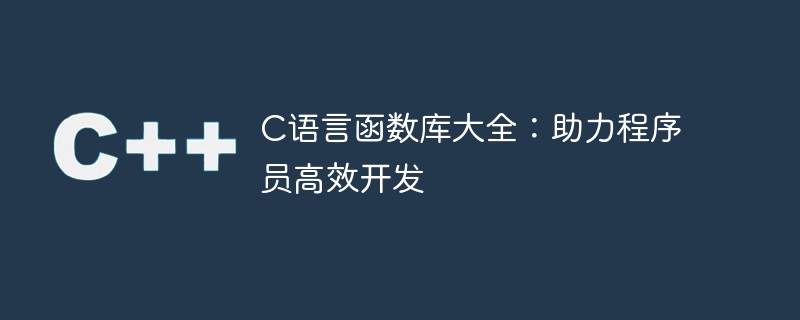

C language function library collection: to help programmers develop efficiently, specific code examples are needed
Abstract: C language is a widely used and powerful programming language. The function library is a widely used tool to facilitate programmer development. This article will introduce you to some commonly used C language function libraries, show how they help programmers achieve efficient development, and provide specific code examples for reference.
Introduction:
As a general-purpose high-level programming language, C language is widely used and favored for its simplicity, flexibility and efficiency. However, in actual development, we often need to use a variety of functions to complete specific tasks, such as IO operations, string operations, mathematical calculations, etc. This introduces the concept of a function library. A function library is a set of predefined functions that we can call to complete specific functions, thereby reducing the amount of code and improving development efficiency.
Text:
Standard Library: The C language standard library is an important part of the C language, which contains a large number of basic functions, such as String processing, mathematical operations, input and output, etc. By calling standard library functions, programmers can easily complete common tasks.
Example 1: String processing
#include <stdio.h>
#include <string.h>
int main() {
char str1[] = "Hello";
char str2[] = "World";
strcat(str1, str2);
printf("%s
", str1);
return 0;
}The above code uses the strcat function to append str2 to str1 , and output the result through the printf function. This example demonstrates the power of the standard library for string processing.
Math Library: Math Library is another important part of the C language and is used to perform various mathematical calculations, such as trigonometric functions, exponential functions, and logarithms. functions etc.
Example 2: Trigonometric function calculation
#include <stdio.h>
#include <math.h>
int main() {
double angle = 45.0;
double radian = angle * 3.14159 / 180.0;
printf("sin(%.2f) = %.2f
", angle, sin(radian));
printf("cos(%.2f) = %.2f
", angle, cos(radian));
return 0;
}The above code uses the sin and cos functions in the math function library to calculate the sine of an angle and cosine value, and output the result through the printf function. This example demonstrates the powerful computing power of the math function library.
File operation function library (File I/O Library): The file operation function library provides a series of functions for reading and writing files. By using these functions, we can easily perform file operations such as opening files, reading file contents, writing file contents, etc.
Example 3: File reading and writing
#include <stdio.h>
int main() {
FILE *file = fopen("example.txt", "w");
if (file != NULL) {
fputs("Hello, Function Library!
", file);
fclose(file);
}
file = fopen("example.txt", "r");
if (file != NULL) {
char buffer[100];
fgets(buffer, sizeof(buffer), file);
printf("Content: %s
", buffer);
fclose(file);
}
return 0;
}The above code shows the use of the file operation function library. Open a text file through the fopen function, then use the fputs function to write a piece of content to the file, and finally use the fclose function to close the file. Then, use the fopen function to open the file in read mode, use the fgets function to read the file content, and use the printf function to output the file content.
Conclusion:
The C language function library provides programmers with a rich set of functions, which can effectively reduce the amount of code written and improve development efficiency. This article introduces three commonly used function libraries, namely standard function library, mathematical function library and file operation function library, and provides specific code examples for reference. I hope this article can help readers better understand the role of function libraries and use them flexibly in actual development.
The above is the detailed content of A Comprehensive Guide to C Language Function Libraries: Accelerating Programmers' Efficient Development. For more information, please follow other related articles on the PHP Chinese website!
 setInterval
setInterval
 What is the shortcut key for brush size?
What is the shortcut key for brush size?
 Detailed explanation of linux dd command
Detailed explanation of linux dd command
 How to solve disk parameter errors
How to solve disk parameter errors
 What are the SEO diagnostic methods?
What are the SEO diagnostic methods?
 What are the css3 gradient properties?
What are the css3 gradient properties?
 The most promising coin in 2024
The most promising coin in 2024
 What does pycharm mean when running in parallel?
What does pycharm mean when running in parallel?
 The difference between PD fast charging and general fast charging
The difference between PD fast charging and general fast charging




